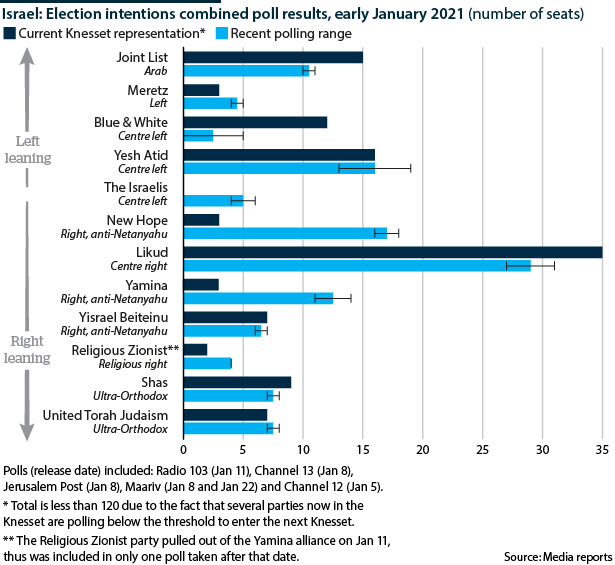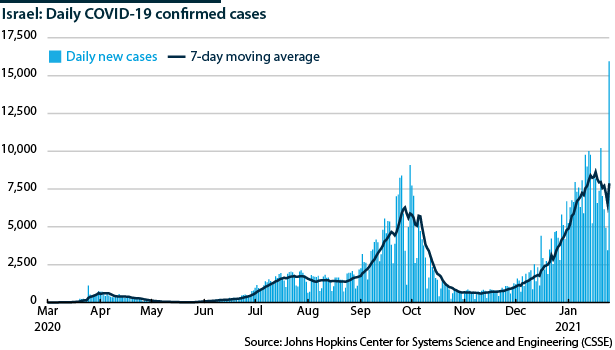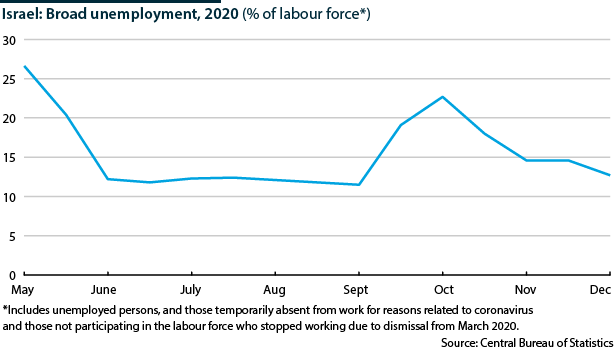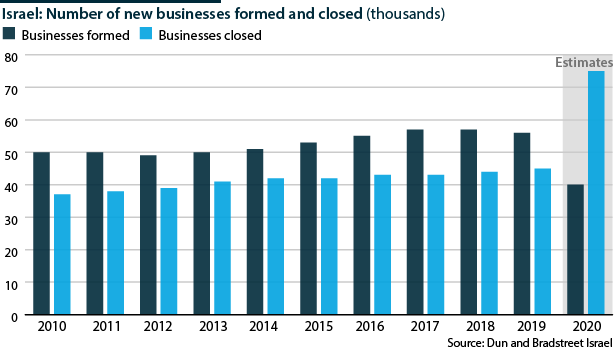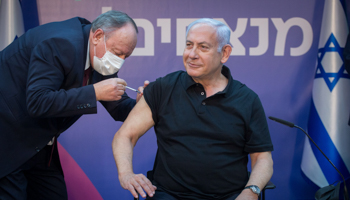Israel’s Netanyahu rushes vaccines and grants to polls
Election campaigning reflects COVID-19 responses, the premier’s corruption trial and US-Iran shifts
Health ministry officials today called for the extension of the national lockdown beyond January 31, as COVID-19 cases rose despite a rapid vaccination campaign. Closures have sparked rioting in ultra-Orthodox areas and hit the economy hard, with Prime Minister Binyamin Netanyahu on January 24 announcing a USD1.75bn universal grant programme -- sparking charges of political bribery, just two months before Israel’s fourth election in two years.
What next
Israel’s successful vaccine programme, with which Netanyahu is closely associated, is scheduled to have inoculated all adults by end-March, offering a potential popularity boost. However, economic recovery will lag, as the third lockdown and political uncertainty created by the election are a drag on businesses and employment. Election fatigue could exacerbate a growing lack of confidence in the premier over the COVID-19 resurgence.
Subsidiary Impacts
- Netanyahu’s trial, the evidentiary stage of which begins on February 8, will increase national polarisation.
- Although the recent normalisation with some Arab countries is popular, its political impact will be overshadowed by domestic issues.
- Any sudden crisis in relations with Tehran and Washington could cause an electoral upset.
Analysis
The final shape of the parties competing in the March 23 election will be fixed on February 2, when they submit their election lists. However, opinion polls indicate that the upcoming election will differ significantly from previous polls. They show that Netanyahu's Likud party remains the largest faction, but he now faces strong challengers from opponents on the right. In disarray, the centre-left appears destined to play a secondary role.
Netanyahu and Likud have been hurt politically by the government's mismanagement of the pandemic crisis and by bitter infighting with their Blue and White coalition partners during the brief life of their 'national unity' government (see ISRAEL: Political wrangles will worsen COVID-19 impact - October 16, 2020).
Religious conservatives, long-term Netanyahu supporters, object violently to closure of schools and worship gatherings
The government never submitted a 2020 or 2021 budget to parliament, made other policy decisions or filled many key government posts due to persistent standoffs between the two main coalition partners. Three lockdowns and other restrictions pushed the economy into a deep recession and have sparked ultra-Orthodox riots in recent days (see ISRAEL: Society faces a split over the ultra-Orthodox - November 3, 2020), but have failed to contain the pandemic.
Rise of the right
Likud's weakness has enabled two other right-wing parties to emerge as the second- and third-largest factions:
- New Hope was formed in December by long-time Netanyahu rival Gideon Sa'ar, after the latter left Likud. Sa'ar has been joined by several other Likud legislators.
- Yamina -- led by Naftali Bennett, another rival of Netanyahu's for leadership of the right -- had been gaining strength even before elections were called, capitalising on the government's perceived COVID-19 failures.
Netanyahu can count on the support of his traditional allies, the two ultra-Orthodox parties Shas and United Torah Judaism, but that will be insufficient to muster a Knesset majority.
The parties identified with the religious right are likely to capture a majority of Knesset seats, but may still not be able to form a government. Sa'ar has promised not to serve in a Netanyahu coalition. Bennett has avoided such an explicit commitment, but his past dealings with Netanyahu have ended badly -- and the recent experience of Alternate Prime Minister Benny Gantz would serve as a warning.
Decline of the left
Gantz's Blue and White has been weakened even more than Likud by the government's behaviour and is no longer the standard-bearer of the centre-left. Members have been fleeing, including leaders Avi Nissenkorn and Gabi Ashkenazi. Polls suggest it may not pass the minimum number of votes to enter the next Knesset.
However, it appears many of its 'anyone but Netanyahu' votes are drifting to the new rightist parties rather than other centre-left parties, which are struggling:
- Yesh Atid, led by Yair Lapid, may end up with fewer Knesset seats than now, below any of the three right-wing parties.
- Labour, historically the dominant centre-left party, may also not capture enough votes to enter the next Knesset.
- After a strong start, The Israelis, a new party formed by Tel Aviv Mayor Ron Huldai and joined by Nissenkorn, has plunged quickly in the polls, struggling to find space within the shrinking and overcrowded left.
The Joint List, an alliance of Arab parties, is splintering, and seems likely to capture significantly fewer than its existing 15 seats. Despite past antipathy, Netanyahu has been campaigning for Arab votes and may give an Arab a place on the Likud list.
Pandemic impact
Multiple lockdowns and restrictions have failed to contain COVID-19. Policy has often been confused and tainted by suspicions that measures follow political rather than public health logic. The first two lockdowns reduced contagion rates, but only temporarily, as officials struggled to devise a successful 'exit' programme.
Daily new COVID-19 cases reached a fresh high in early January, and although they have since declined somewhat (and remain within the capacity of the healthcare system), this month has seen the highest number of deaths so far, topping 1,000.
32%
Proportion of Israel's population that has received a vaccine shot
However, the government has been highly successful in its vaccine drive, serving as the world forerunner (see INT: Israel's COVID success will be hard to emulate - January 11, 2021). Israel secured supplies early on from Pfizer and Moderna and began its programme on December 20. Almost one-third of the population has already been inoculated with at least one dose, including most at-risk groups. Over-40s and 16-18-year-olds are now eligible for jabs.
Netanyahu, pinning his political hopes on the campaign, has set an end-March deadline to have all adults vaccinated. Nonetheless, even if the target is met, economic recovery will face longer delays.
Economic pressures
Israel has coped with the pandemic better than most developed economies, in part because of the resilience of key sectors. High-tech continues to prosper, because it is better adapted to working at home than most other industries and has benefited from accelerated global adoption of digitisation and remote services (see ISRAEL: Lingering downturn may dampen high-tech boost - December 22, 2020).
Conversely, the retail, personal services and entertainment sectors have been decimated by the repeated lockdowns and social-distancing rules. Many businesses have been shut continuously since the first lockdown, with a negative impact on employment.
Small firms and the self-employed have been particularly hurt by the lockdown rules and the ineffectiveness of bureaucratic government aid. Israel is expected to show a net decline in businesses in 2020 and 2021 as the number of closures exceeds the number starting up.
A new universal household grant plan, with other assistance packages, thus seeks to bring forward the economic 'feel good' factor, ahead of polls.
Foreign policy
Failing that, a second potential tactic is external distraction. The outgoing government's greatest success was in foreign policy, establishing ties in late 2020 with the United Arab Emirates (UAE), Bahrain, Sudan and Morocco, as well as boosting informal relations and security cooperation with Saudi Arabia (see GULF STATES/ISRAEL: Ties could change deep structures - January 21, 2021).
Although the shadowy nature of their 'cold war' makes it difficult to assess, Israel may also have succeeded in slowing Iran's nuclear programme through cyber and conventional attacks (see ISRAEL/IRAN: Escalation is possible before end-2020 - December 9, 2020). However, those successes depended to a great extent on backing from former US President Donald Trump.
New US President Joe Biden wants to rejoin the 2015 Iran nuclear accord -- and will look askance at Israeli actions undermining that goal. The new administration will also curb Netanyahu's gains on West Bank settlement expansion and resume aid to the Palestinians, even though a renewed peace process remains unlikely.
